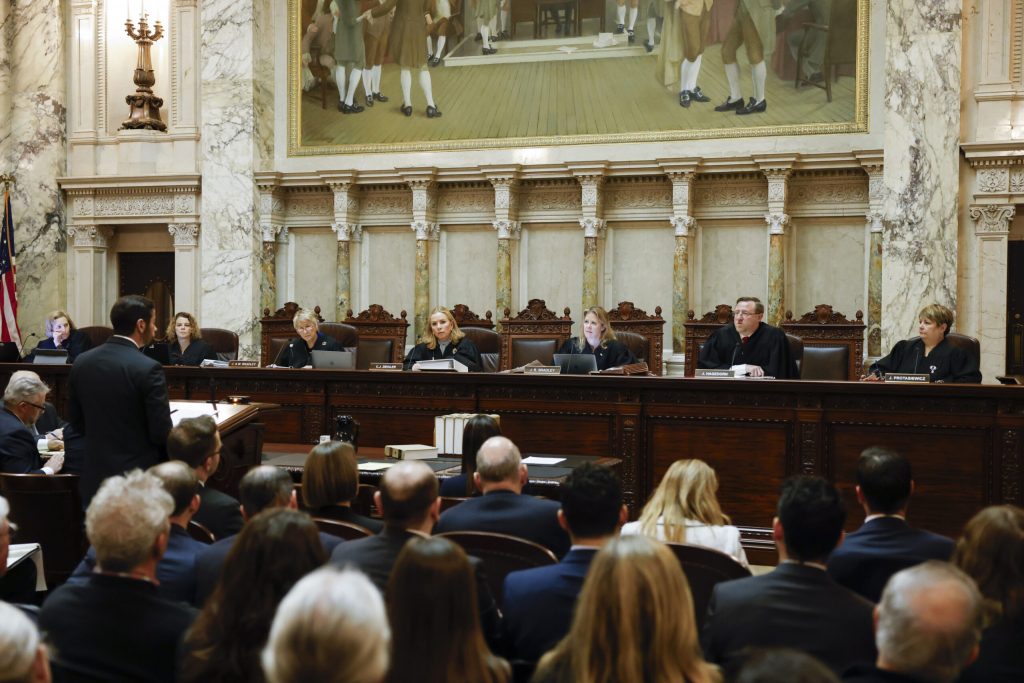Wisconsin Supreme Court Considering Whether Man With Expunged Domestic Violence Conviction Can Buy Guns
DOJ says federal law prevents individual with 1994 conviction from buying a handgun.

The Wisconsin Supreme Court listens to arguments from Wisconsin Assistant Attorney General Anthony D. Russomanno, who is representing Gov. Tony Evers, in a redistricting hearing at the Wisconsin state Capitol Building in Madison, Wis., on Tuesday, Nov. 21, 2023. Ruthie Hauge/The Capital Times via AP
A man whose domestic violence conviction was expunged from his record is urging the Wisconsin Supreme Court to let him buy a gun. During oral arguments Thursday, justices questioned whether federal law allows it.
Scot Van Oudenhoven was convicted of domestic abuse in 1994, but the conviction was expunged from his record in 2019 by a Calumet County circuit court. In 2022, he tried to purchase a handgun, but the Wisconsin Department of Justice blocked him, saying federal law banned the purchase.
Van Oudenhoven then asked the courts for review, and a Winnebago County circuit court and the District 3 Wisconsin Court of Appeals both ruled against him.
Standing before the Wisconsin Supreme Court, Van Oudenhoven’s attorney, John Monroe, said the lower courts were wrong. He said federal law clearly states people can buy firearms if their misdemeanor domestic violence convictions are expunged unless a judge says they cannot.
“And the expungement order that Mr. Van Oudenhoven received in 2019 does not contain that information,” Monroe said. “It doesn’t say anything at all about firearms.”
Monroe also argued Van Oudenhoven’s domestic violence conviction no longer qualifies as a crime under federal law because of the expungement.
Liberal Justices Rebecca Dallet, Jill Karofsky and Janet Protasiewicz questioned whether it was even legal to expunge Van Oudenhoven’s record more than two decades after his conviction.
“Whether or not someone can be expunged is determined at the time of sentencing. And just from your recitation of the facts, it’s very clear that that didn’t happen here, that it was not until 2019 that his conviction was expunged from a 1994 case,” Dallet said. “So, what am I supposed to do with that?”
Monroe said he didn’t have an answer, but agreed “there is some kind of irregularity.” He said the issue was never raised during the appeal.
Justices then questioned how they should interpret the meaning of the federal law and a federal appeals court decision in a similar case. Monroe said the court “shouldn’t even be talking about interpreting the statute, unless it’s ambiguous.”
“And Congress used the word ‘expungement,’” Monroe said. “Wisconsin uses the word ‘expungement’ on its face. There’s no ambiguity.”
‘I’m really troubled by the facts of this case’
At one point during arguments, Karofsky said that with 85 domestic violence deaths in the state in 2023, “there’s a good reason” for the law denying convicted domestic abusers from buying guns.
“To say it’s a deadly combination doesn’t even begin to describe what the combination of guns and domestic violence means,” Karofsky said. “So, I don’t understand why we’re here, and I’m really troubled by the facts of this case and what it’s going to mean going forward.”
She then repeated Dallet’s concern about Van Oudenhoven’s expungement.
“I don’t know what to do if this expungement was illegal on its face, and then we’re supposed to just uphold what may be an illegal expungement,” Karofsky said. “I understand that no one has brought this up, but I don’t understand how we can do that.”
Conservative Justice Rebecca Bradley responded and said nothing in the case record would enable the court to determine whether the expungement was legal or not.“And that’s why it’s not an issue,” Bradley said.
Chief Justice Annette Ziegler, a fellow conservative, agreed. She said it would be a “sea change” to reverse a criminal case in a civil lawsuit in which neither the DOJ or the local district attorney raised the issue as an argument before the court.
Assistant Attorney General Brian Keenan told justices that despite the expungement, Van Oudenhoven’s criminal record still remained under federal law.
“The conviction is expunged, not the records related to the conviction,” Keenan said.
Conservative Justice Brian Hagedorn pushed back and said while there are different approaches in some states, many like Wisconsin use expungement as a term related to deleting case records. He said it’s unlikely Congress intended it to mean anything else.
“To me, it’s a weird reading of a statute to say expungement means something it doesn’t mean almost anywhere where it’s used,” Hagedorn said.
Keenan stood by his interpretation and reiterated that under the federal statute a conviction needs to be expunged, not just the records related to the case.
Wisconsin Supreme Court considering whether man with expunged domestic violence record can buy guns was originally published by Wisconsin Public Radio.
If you think stories like this are important, become a member of Urban Milwaukee and help support real, independent journalism. Plus you get some cool added benefits.



















